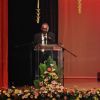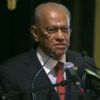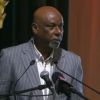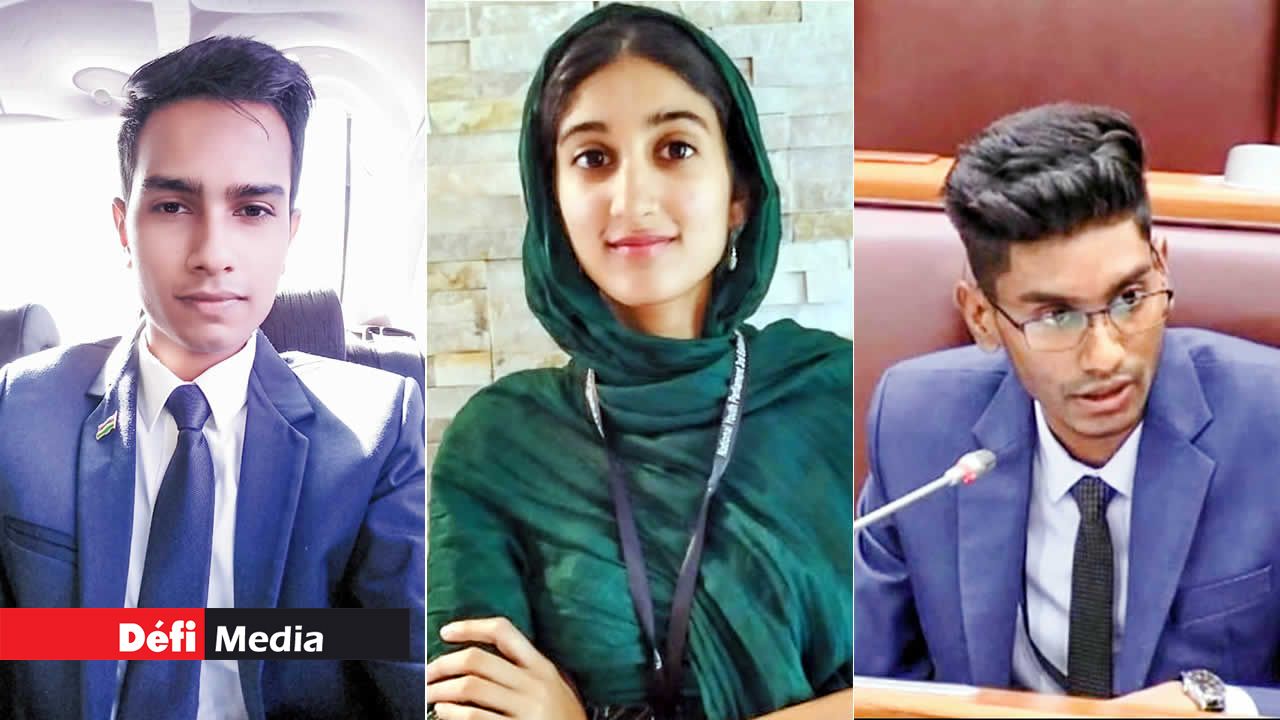
Democracy plays a vital role in all societies as it promotes values of freedom, peace and security as well as economic development and human rights. This year’s theme for the International Day of Democracy, “Empowering the next generation,” focuses on young people’s essential role in advancing democracy. News on Sunday talks to stakeholders about the role of the Mauritian youth in democracy. Three promising young Mauritians also share their views with us on how to ensure that our youth’s voices are included in the decisions that have a profound impact on their world.
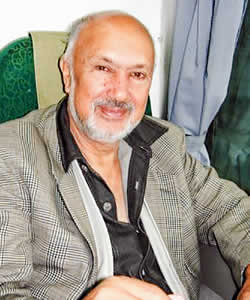
From its birth in ancient Greece thousand years ago to today, democracy is the bedrock of inclusive, resilient and peaceful societies. Observed on 15th September, the International Day of Democracy celebrates the system of values democracy promotes but also provides the opportunity to reflect on the importance of democracy in present societies as well as recognise the threats and challenges democracies face in the 21st century.
This year’s theme for the International Day of Democracy, “Empowering the next generation,” aims to empower the next generation by focusing on the critical role of children and youngsters in the democracy of today and the future. According to Dr Michael Atchia, Pedagogue and member of the Democracy Watch Team, Mauritius has done well as a democratic society during the past five years.
“Mauritius has fared comparatively very well during the past five years, from 2019 to 2023, due to both the positive actions of Government and the resilience of our people. We can also argue that we have been spared the extremes such as hurricanes in the West Indies, floods in Pakistan and Libya, war in Ukraine, earthquakes, extremes of discrimination and poverty in Afghanistan, COVID deaths in China and USA and so on. So, there is the crucial need to educate, empower and then give real roles to the youth, to the next generation. Total niet those in position of responsibility, leaders of parties, politicians and others who hang on in power and do not make way, at best gradually, to the next generation. Like the Sir Seewoosagar Ramgoolam and Sir Veerasamy Ringadoo and others in 1982 who were then swept out of power by a most humiliating defeat of 60/0!,” he states.

For Prisheela Mottee, President of Raise Brave Girls Association, it is a must to empower the next generation. “The future of the world lies in the hands of the next generation. It is our duty to leave a sustainable legacy for the future generation. Empowering the next generation must become of one of the pillars of our society. It is time or never for us as a society to start empowering the next generation to take the lead in a sustainable way though education, empowerment programs, scholarships or micro finance aid for entrepreneurship programs. The government as well as private stakeholders have to create the appropriate framework in respective fields to bring our young people to the next level. We have to move forward with a youth talent for a better society,” she utters.
Indeed, both stakeholders are of the opinion that the youth play an essential role in advancing democracy. Dr Atchia trusts that encouraging the youth’s contribution in various domains is the way forward. “Democracy is surely the best method of governance ever invented. It must be fully practiced, as it is in our country and, equally important, to transmit that tool to the next generation. Give youth a broad education and encourage their contribution to innovation, their contribution to entrepreneurship and surely for those who will engage in politics, their contribution to do things differently: service oriented, incorruptible, efficient, open to the best ideas from science and technology and from the world-scene, to move Mauritius upwards,” he declares. He further underlines that we must put an accent on citizens political education, which, he asserts, will give results.
According to Prisheela Mottee, the youth not only have a fresh perspective of all matters related to society but also can bring forward new ideas and solutions to the society. “The youth will come forward with innovative ideas and also voice out. Once, we create the appropriate platform, the youth will have the required space to share their views and ideas. The ability to speak and voice is in itself one of the pillars of a democratic country.” She avers that many Mauritians youth are not only silent voters. “It can be observed that the Majority of Mauritian are interested in politics but quite reserved about being involved in active politics. We have a well educate electorate in Mauritius but at same time the youth tend to hold their privacy concerning their political views and colours. We can analyse that our youth are not only silent voters but also good observers,” she states.
Challenges between democracy and youth
Many democratic societies and governments around the globe are facing new obstacles. Mauritius is also not spared. According to our stakeholders, there are definitely challenges in the way when it comes to democracy and the youth in Mauritius.
Dr Atchia asserts that during the next biennium, that is 2023 to 2024, we Mauritians must consolidate good governance and the key areas such as free press and democracy, stronger protection of freedom of expression and other fundamental human rights; independence of the judiciary and other institutions, people participation, leadership at the service of people and country, not of self, family and friends.
So, he highlights, it is necessary to list some of the key areas Mauritius must address during this biennium.
Achieving food and renewable energy self-sufficiency; continuous monitoring of prices and cost of living backed by increased local production of many items of necessity from our own resources, especially marine;
Fresh water management to reduce waste, and make best use of our rainfall, including new technologies such as desalination, water-vapour capture etc;
Review, both in Government and para-statal bodies and the private sector, the directors and cadres in place to put the best available talents and expertise at the head, thereby reversing any destructive tendencies (during 2009-23) from those in power of naming their own people, independent of ability (i.e., Meritocracy to replace nepotism); review recruitment into the public service and the Police;
For a fully functional, creative and dynamic Parliament, a key seat of Democracy, with full effective action from the opposition, an independent speaker and a Shadow Cabinet; electoral integrity guarantees;
Space for meaningful civil society and youth participation in the consultation process;
Consolidating the actions of regional and world-wide alliances (such as SADC, COI, G20, African Union etc.) as well as strengthening our commercial and political relationships with other Indian Ocean islands, friendly countries such as China, India, Australia, Japan, Malaysia, Middle-East countries, EU, USA and ALL Southern and Eastern African countries, among others;
The Planet’s climate crisis CANNOT be solved by single countries acting alone, however big they are. Even more so for SIDS. Mauritius has an important role as a leader of the SIDS (Small Islands Developing States, most vulnerable to the climate crisis) to drive the efforts for implementing fully the Paris Agreement and the one from Sharm el Sheik;
A wake-up call to forecast/predict/prepare (through a strengthened catastrophe committee) for future risks and catastrophes, including pandemics, extremes of weather, war, intense cyclones and so on;
In promoting good governance, the government of Mauritius will attach great importance to efficiency, accountability and transparency in the management and utilisation of public funds and resources; strong auditing of government funds, followed by remedial actions;
Continued reform of the education system at all levels, for use of modern pedagogies of teaching and learning curricula geared to leading healthy and successful lives in the 2030s and 2040s of the centuries;
Other key areas.
On her side, Prisheela Mottee trusts that the major issues when it comes to democracy in Mauritius is the difficulty to find a place in the electorate arena. “The issue is that in a democracy people believe that they can trespass liberty of others most specifically on social media. In Mauritius, we have a very well politically educated youth and the few young people who are actively engaged in politics have demarked themselves with their leadership capabilities thus reinforcing our democracy,” she affirms.
Ensure youth’s voices are included
In what ways can we ensure that our youth’s voices are included in the decisions that have a profound impact on their world? “By allowing them the space, be it in the press, on Radio and TV, in politics, in management, in local government, in financial institutions, in planning the future. Gradual but real presence and participation of young people and not just token space,” declares Dr Atchia.
Young people are the current and future custodian of democracy. Prisheela Mottee believes that in order to allow our youth in Mauritius to play this important role it is key to empower them through empowerment and leadership programmes. “Topics on democracy should be included in our school curriculum to better prepare our children to be inculcated with democratic values,” she utters. In order to ensure that our youth’s voices are included, the President of Raise Brave Girls Association is also of the opinion that the youth must be included in various platforms and programs. “The actual system provides for National Youth Parliament which is a laudable initiative and such programs should be encouraged and also proposed to colleges. Youth should also be invited on radio and TV shows in order to give way to their voices.”
Youth Testimonies
Sabah Wahedna: “A meaningful democracy requires a meaningful participation of youths”
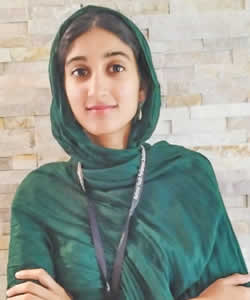 The young lady studied political science at Yale University, USA and completed Specialist Diploma in Political Science, at Bircham University, Spain. She believes that the youth of today certainly play a key role in advancing democracy. “A meaningful democracy requires a meaningful participation of youths. By voicing out, and giving opinions on national and international issues, youths have enhanced democratic processes and made a change by educating others economically, and politically,” she states.
The young lady studied political science at Yale University, USA and completed Specialist Diploma in Political Science, at Bircham University, Spain. She believes that the youth of today certainly play a key role in advancing democracy. “A meaningful democracy requires a meaningful participation of youths. By voicing out, and giving opinions on national and international issues, youths have enhanced democratic processes and made a change by educating others economically, and politically,” she states.
An engaged, well-educated electorate is at the heart of strong democratic societies. What about the Mauritian youth? “Studies show that today’s generation are on the way to being phenomenally, the most educated one. The Mauritian youth, specifically, has attained great success academically, which is imperative for an equal, responsible society. Our access to the live parliament TV, to news channels, to political debates on private radio stations, has increased our knowledge politically and nationally. It is hence our duty to use the information we gain in consolidating democratic values and transmitting them when the time comes,” utters Sabah.
When it comes to issues concerning democracy and the youth in Mauritius, the young woman is of the opinion that technology has brought with it several challenges. “In the quest towards keeping the public thoroughly informed, this technological era has inescapably fallen prey to misinformation. The result has ignited a distrust and cynicism of politics in the youth, which has in turn led to a disconnect towards politicians. Since information is at the core of a healthy democracy, youths should be guided on how to counteract the threats of technology and identify credible sources, both on the national and international level. ill-informed masses after all put democracies at risk.”
Another issue, underlines Sabah, that has been the norm within societies is the perception of the youth being inexperienced and lack knowledge in career fields they pursue. “Such age barriers sever the youth from actively engaging in society, and often feeds discriminations. Youths are constantly required to prove excellence, which undermines democratic inclusion within workplaces,” she asserts.
According to the Mauritian youth, the government should increase political knowledge at the school level itself, by introducing civic subjects, organising frequent debates and open talks to discuss and educate youths about the inner workings of our democracy. “A real-life experience should be introduced in schools around activities that refer to the pillars of our democracy. Young teens who are taught about rights, respect, equality, and citizenship from a young age would use their voting power better in their near future and be major contributors to the society.”
She adds that for a democracy to be inclusive, information needs to be accessible. “Using technology as tool, a democratic literacy project can be implemented, which provides online information of the history, the geography, the economy, the culture, and the main local issues of Mauritius. Thus, keeping young citizens constantly educated and informed about the country, local politics, and democracy. An interactive digital experience,” she states.
In order to ensure that youth’s voices are included in decisions that impact their world, Sabah is of the opinion that youths should be encouraged to participate in government initiatives and forums, whereby bright ideas are selected and implemented by concerned ministries, without long bureaucratic delays. “By recognizing the youths’ political potential, our government would ensure that young minds and voices make an impact in the national decisions of the country. Politicians, along with their policy administrators should hence engage with youth at earlier stage. It would be wrong and dismissive to label the youths as a generation in complete disinterest of politics. Referring to the disastrous, Wakashio oil spill that hit our country in 2020, we discern how youths became engaged, fearless, and brave. It should not take a tragedy of great proportion for youths to realise their political potential and for elders to recognize the patriotism that youths hold for their country.”
Ziyaadkhan Hossen: “Addressing socio-economic issues are critical to ensuring the active involvement of Mauritian youth in the democratic process”
 Ziyaadkhan is a Finance and Law student at the University of Mauritius. In addition to his studies, the 22-year-old man serve as the President of the UoM Accounting and Finance Society. According to the young man, youth are not merely the leaders of tomorrow; they are active participants and change-makers even today. “Their fresh perspectives, innovative ideas, and passion for social change infuse democracy with renewed vigour and momentum. Young people do not bring lots of experience, but they do bring unique ones, enabling them to mobilise and organise effectively, amplifying their voices on critical concerns in this contemporary era. Engaging youth in the democratic process promotes a culture of inclusivity, ensuring that policies and decisions reflect a broader range of perspectives and priorities, ultimately leading to a stronger and more vibrant democracy,” he says.
Ziyaadkhan is a Finance and Law student at the University of Mauritius. In addition to his studies, the 22-year-old man serve as the President of the UoM Accounting and Finance Society. According to the young man, youth are not merely the leaders of tomorrow; they are active participants and change-makers even today. “Their fresh perspectives, innovative ideas, and passion for social change infuse democracy with renewed vigour and momentum. Young people do not bring lots of experience, but they do bring unique ones, enabling them to mobilise and organise effectively, amplifying their voices on critical concerns in this contemporary era. Engaging youth in the democratic process promotes a culture of inclusivity, ensuring that policies and decisions reflect a broader range of perspectives and priorities, ultimately leading to a stronger and more vibrant democracy,” he says.
Speaking about predominant issues concerning democracy and the youth in Mauritius, Ziyaad is of the opinion that in Mauritius, like many parts of the world, youth face specific challenges when it comes to democracy. “One prominent issue is political apathy and disengagement among the youth. Many young people feel disconnected from the political process due to a lack of meaningful representation, limited access to civic education, and disillusionment with the current political landscape. These can be substantiated when looking at the voting proportion of the youth for previous general elections. Additionally, unemployment and underemployment are pressing concerns, which can lead to a sense of disempowerment and frustration. Adequate representation and addressing socio-economic issues are critical to ensuring the active involvement and meaningful participation of Mauritian youth in the democratic process.”
The young man trusts that empowering Mauritian youth necessitates a holistic approach involving both society and the government. “Firstly, enhancing civic education is crucial, educating young people about democratic principles, political structures, and their rights and responsibilities as citizens. Additionally, fostering youth-friendly platforms for dialogue and participation can encourage their involvement in decision-making processes. A commendable initiative by the government to try accomplishing these objectives, amongst others, was the National Youth Parliament of which I was a participant in the third edition in 2023. But, much work still need to be done in terms of policies that address youth unemployment, improve access to quality education, and create opportunities for skill development and entrepreneurship. Furthermore, promoting youth representation in various decision-making bodies and supporting youth-led initiatives can inculcate a sense of ownership and responsibility, fostering a culture where young voices are valued and influential,” he declares.
In what ways can we ensure that our youth’s voices are included in the decisions that have a profound impact on their world? “Ensuring youth voices are incorporated into impactful decisions demands intentional efforts at various levels. Firstly, establishing mechanisms for youth consultation and participation within governmental structures is essential. This can be achieved through dedicated youth advisory councils, regular engagement meetings, and online platforms for feedback and suggestions. Encouraging political parties and institutions to promote young leaders and reserve seats for youth in legislative bodies can also enhance representation. Creating mentorship programs that connect experienced leaders with young individuals is not a dream today, thanks to the Youth Mentorship Programme. Ultimately, a cultural shift that values and respects the insights and contributions of young people is fundamental to achieving a truly inclusive democracy,” asserts Ziyaad.
Ritesh Daworaz: “Democracy provides a platform for youth to have a say in the governance of their countries”
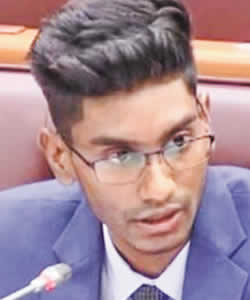 Ritesh works as a public officer at the Land Use & Planning Department at the District Council of Flacq and is also a part-time student in BSC Town and Country Planning (Top-Up) at the University of Mauritius. He underlines that as per the Economic Intelligence Unit (EIU) published its Democracy Index, Mauritius is ranked 21st with an overall score of 8.14. Moreover, Mauritius enters the rank of “full democracy” and remains the only nation in Africa to fall under this regime. “This prime position is a testament to how Mauritius emerges as a robust democratic and economic model in the region,” he says.
Ritesh works as a public officer at the Land Use & Planning Department at the District Council of Flacq and is also a part-time student in BSC Town and Country Planning (Top-Up) at the University of Mauritius. He underlines that as per the Economic Intelligence Unit (EIU) published its Democracy Index, Mauritius is ranked 21st with an overall score of 8.14. Moreover, Mauritius enters the rank of “full democracy” and remains the only nation in Africa to fall under this regime. “This prime position is a testament to how Mauritius emerges as a robust democratic and economic model in the region,” he says.
According to him, in Mauritius, the youth are actually playing an essential role in advancing democracy in various ways. “We can see that there are many young Mauritians that are actively involved in mainstream political parties, while others are forming their own youth-led political movements, bringing fresh perspectives to the political landscape. There are more youth-led civil society organizations, associations, and movements in Mauritius in order to address a wide range of issues, including environmental conservation, social justice, and human rights,” he states. He states that the relationship between youth and democracy is symbiotic. “Democracy provides a platform for youth to have a say in the governance of their countries, while youth bring vitality, fresh perspectives, and energy to the democratic process. Empowering young people to participate actively in democracy is essential for building inclusive, responsive, and resilient democratic societies,” he utters.
When it comes to issues, he is of the opinion that factors such as the brain drain has a negative impact. “As we tend to see, there is the emigration of highly educated and skilled youth seeking better opportunities abroad, which is leading our country to a loss of talent and civic engagement. The sociocultural factors, including gender norms and traditions, might discourage some youth, particularly young women, from participating and being active in politics. The mental health challenges faced by some young people can affect their ability to engage in politics and civic activities effectively. Moreover, political polarisation in the country seems to be discouraging young people from engaging in constructive political discourse and working across party lines.”
However, he claims that our society and government are making numerous efforts in order to empower the Mauritian youth. “For example, through the organisation of the National Youth Parliament 2023, which has provided a platform for young people to learn about the democratic process, express their views on climate change, and gain experience in politics. A National Youth summit was organised in August 2023 with the objectives of establishing and maintaining effective communication between the government and the youth. However, what can also be done by the government is to invest in accessible, high-quality education from early childhood through higher education and ensure that schools provide relevant and up-to-date curricula that equip youth with critical thinking, problem-solving, and digital literacy skills,” he utters.
He also believe that there should be a promotion of job creation and economic growth through policies that support businesses, more targeted employment and fund allocation for training programmes for employees working in both the private and public sectors, the establishment of a job centre whereby it is responsible for job networking, job fairs, and career counselling to help youth explore career options and find employment and the inculcation of a Gurukul system in our education to assist the children in understanding the concept of a balanced life.
Speaking about ways to give way to youth’s voices, Ritesh declares that youth’s voices can be included in the decision-making process; for example, the legal frameworks shall be reviewed in order to include provisions for youth participation in decision-making processes and recognise the importance of their voices. “There should be recognition programmes and awards to celebrate youth achievements in leadership, activism, and community service. There should be adequate support given to youth-led media outlets, such as newspapers, radio stations, or online platforms, where young journalists can report on issues that matter to their generation. There should also be facilitation of intergenerational dialogues and partnerships where youth can learn from experienced leaders and contribute their perspectives to decision-making, among others.”

Notre service WhatsApp. Vous êtes témoins d`un événement d`actualité ou d`une scène insolite? Envoyez-nous vos photos ou vidéos sur le 5 259 82 00 !


















